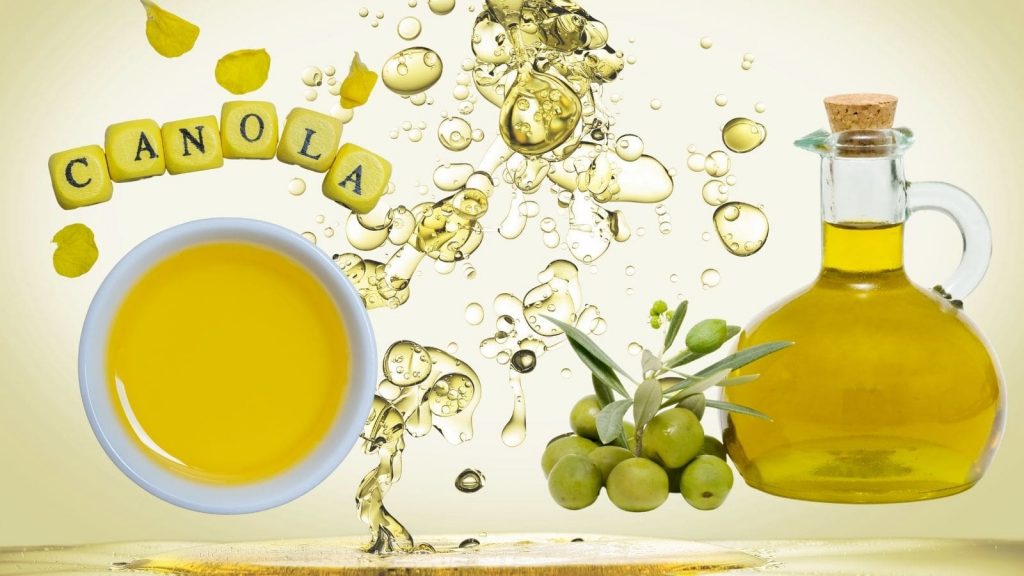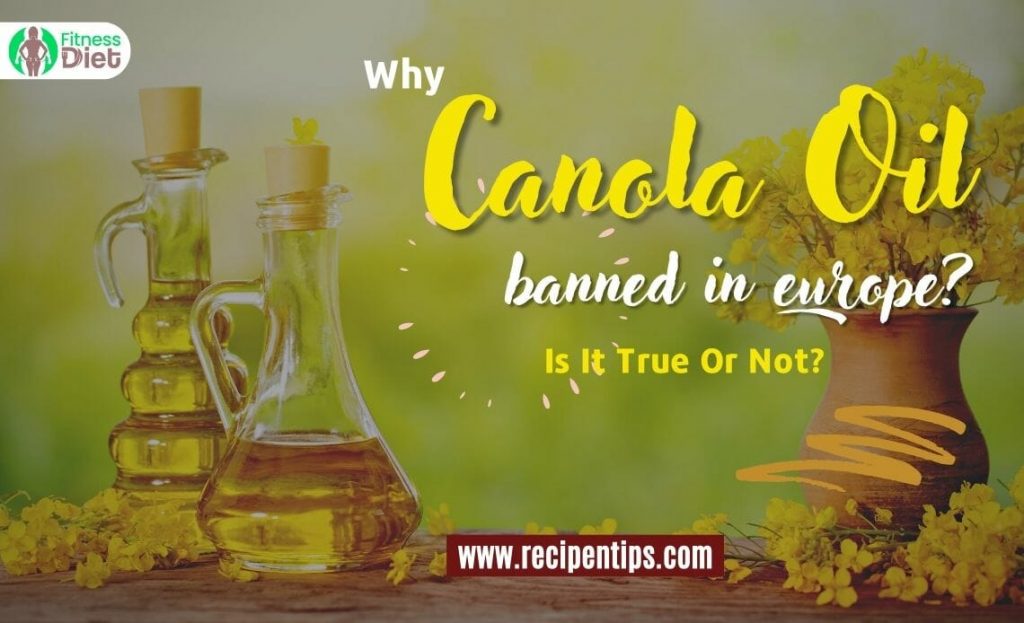There are many rumors that Europe has banned canola oil due to its dangers. Some say that canola oil is no more dangerous than other oils, but others believe that it is. Canola oil is made from rapeseed, and rapeseed contains a chemical called erucic acid.
According to the article on Erucic acid a possible health risk, it can be harmful to children and even adults in some cases. Canola oil also contains trans fats, which are known to be bad for your health.
Actual facts-Why Canola Oil banned in Europe
In recent years, there has been some controversy surrounding canola oil and whether or not it is safe to consume.
Canola oil comes from the rapeseed plant, which is a member of the mustard family of plants. The rapeseed plant produces seeds that contain high levels of erucic acid. Erucic acid is a fatty acid that has been linked to heart disease and other health problems. For this reason, canola oil was banned in Europe in the 1990s.
In present, canola oil is not banned in Europe. I don’t know where this information is from. There are two plants and I have problems differentiating them in English.
They are rapeseed and mustard turnip. I guess. Translator programs translate both in different ways. Canola oil is produced from both plants.
Mustard turnip has been the most common type of canola oil in Finland due to its cheap price and neutral taste.
In recent decades, the production of Finnish canola oil has diminished as a direct result of the disappearance of the neonicotinoid-based plant protection products that the AVA prohibited. Mustard turnip canola oil is still readily available in Finland.
The new mass product in stores now is imported Canadian canola oil (rapeseed), which has surpassed the failure to import non-exported domestic oil. I understand this is not an approved GM product, so I have continued to buy Finnish canola oil (mustard turnip). But our stores are flooded with canola oil (rapeseed).
What is canola oil?

Canola oil is a type of vegetable oil that is extracted from the seeds of the canola plant. The canola plant is a variety of rapeseed plants and was developed in the 1970s as a more edible alternative to traditional rapeseed oil.
Canola oil is high in monounsaturated fats and low in saturated fats, making it a healthier option than other oils. It also has a neutral flavor, making it ideal for cooking.
Where does canola oil come from?
Canola oil is a vegetable oil that is extracted from the rapeseed plant. The plant is a member of the mustard family and is native to Europe. The oil was first used in Canada in the 1970s, and the name “canola” is a combination of “Canada” and “oil.”
Why is Canola oil Banned?
Canola oil is a popular vegetable oil that is used in a variety of foods. However, canola oil is banned in some countries because it contains high amounts of erucic acid. Erucic acid is a fatty acid that can be harmful to the human body.
What are canola oil health dangers?
According to the center for food safety home safety hong kong report that animal experiments have revealed that animals subjected to diets containing excessive erucic acid may have severe health problems, with heart disorders being the main ones.
The most well-known effect on experimental animals is the buildup of lipids in heart muscle fibers, which may reduce the contractile force of heart muscles. Further research is necessary to determine whether or not the dietary intake of erucic acid is the cause of human myocardial fibrosis.
Canada Canola Still Banned From Europe Despite WTO Ruling
In May, the World Trade Organization ( determined that the ban on canola oil imports from Canada was in violation of WTO rules. However, more than six months later, this ban still applies.
Canadian farmers are upset. They felt that the implementation of the WTO ruling would mean an end to the ban and restoration of normal trade. But that has not been the case.
The EU argues that the ban has been upheld because of safety concerns. It points to an instance of the blackleg disease in Canada as evidence of EU concerns that canola from Canada might be unsafe.
However, the Canadian government has argued there is no scientific proof that supports the EU’s claims. Since this request was made, the WTO has ordered the EU to lift the ban.
Is Canola oil toxic to humans?

Is canola oil really toxic to humans? According to some recent studies, it might be. Canola oil is a vegetable oil that is extracted from the seeds of the canola plant. It is often used in cooking and baking because it is a neutral-tasting oil and has a high smoke point. However, what many people don’t realize is that canola oil is highly processed and contains harmful chemicals.
One of the main ingredients in canola oil is hexane. Hexane is a neurotoxin that can cause headaches, dizziness, nausea, and even paralysis. It has also been linked to cancer.
In addition to hexane, canola oil also contains trans fats. Trans fats are known to increase your risk of heart disease and stroke. They also contribute to weight gain and insulin resistance.
So, what’s the bottom line? May I avoid using canola oil?
According to Dr. Guy Crosby’s article on Ask the Expert: Concerns about canola oil our vegetable oils most commonly used in the United States are soybean, canola, palm, and corn oil. These are referred to as refined, deodorized, bleached, degummed oils, or RBD for short, as this describes the process by which these oils are manufactured.
Canola oil also contains a significant amount of polyunsaturated omega-3 (<0xEF><0x81><0xBA> -3) fat (9-11 ), In addition, canola oil contains significant amounts of phytosterols (at about 0.9 by weight) that reduce the absorption of cholesterol into the body.
Variety is a good tip for nutrition, so consuming a wide variety of oils is desirable, such as using extra virgin oil when a distinctive flavor is preferred and canola and soybean oils for other uses.
Both canola and soybean oils have -3 fatty acids that ought to be included in a balanced diet. Of course, avoiding overheating and burning oils is paramount.
Why does Canola oil have a bad reputation?
Canola oil has a bad reputation because it is made from genetically modified rapeseed. The word “canola” stands for “Canadian oil, low acid.” Canola oil is used in many processed foods and is also a popular cooking oil.
Some people avoid canola oil because it is a source of trans fats. Trans fats are created when food manufacturers use a process called partial hydrogenation to make oils more solid at room temperature.
This process also makes the oils more shelf-stable and less likely to go rancid. However, trans fats have been linked to an increased risk of heart disease and other chronic health conditions.
Not all canola oil is partially hydrogenated, but it can be difficult to know which products contain partially hydrogenated oils and which don’t. It is better to concern your health expert if you have any health issues with using cooking oil.
What is the healthiest type of oil?

Canola oil is a healthy option for both cooking and baking. It has a neutral flavor, so it won’t alter the taste of your food. When substituting canola oil for other oils in recipes, you may need to experiment to find the right ratio, as canola oil is less viscous than other oils.
Is Canola oil better than Olive oil?

Canola oil and olive oil are two of the most popular choices, but how do they compare?
Canola oil is a good choice for everyone who would like to buy healthy cooking oil. It is low in saturated fat and high in monounsaturated fat, which can help to lower cholesterol levels. Additionally, canola oil has a high smoke point, meaning that it can be used for frying without producing harmful chemicals.
Olive oil is also a healthy choice for cooking, as it too is low in saturated fat and high in monounsaturated fat. However, olive oil has a lower smoke point than canola oil, so it is not ideal for frying.
Is Canola the same as Mustard?

Canola oil and mustard oil are two of the most commonly used oils in India. Both oils have their own unique flavor and aroma. Mustard oil is made from the seeds of the mustard plant, while canola oil is made from the crushed seeds of the canola plant.
Mustard oil has a strong, pungent flavor that some people find unpalatable. Canola oil has a milder flavor and is more versatile in cooking.
Mustard oil is a good source of monounsaturated fats and omega-3 fatty acids, which are beneficial for heart health. Canola oil is also a good source of these healthy fats.
What are alternatives to canola oil?
There are a few different oils that can be used as an alternative to canola oil. One option is olive oil. Olive oil is a type of vegetable oil that is extracted from olives. It has a high smoke point, which makes it ideal for cooking at high temperatures.
Another option is avocado oil. Avocado oil has a similar smoke point to olive oil and is also rich in healthy fats. A final option is coconut oil. Coconut oil has a lower smoke point than the other two oils, but it is solid at room temperature, which makes it ideal for baking recipes.
In conclusion, it is not true that canola oil has been banned in Europe. While some countries have placed restrictions on the use of the ingredient, it remains a popular choice in many households.
Canola oil is a healthy and versatile option for cooking and baking, and there is no evidence to suggest that it is unsafe for consumption.



